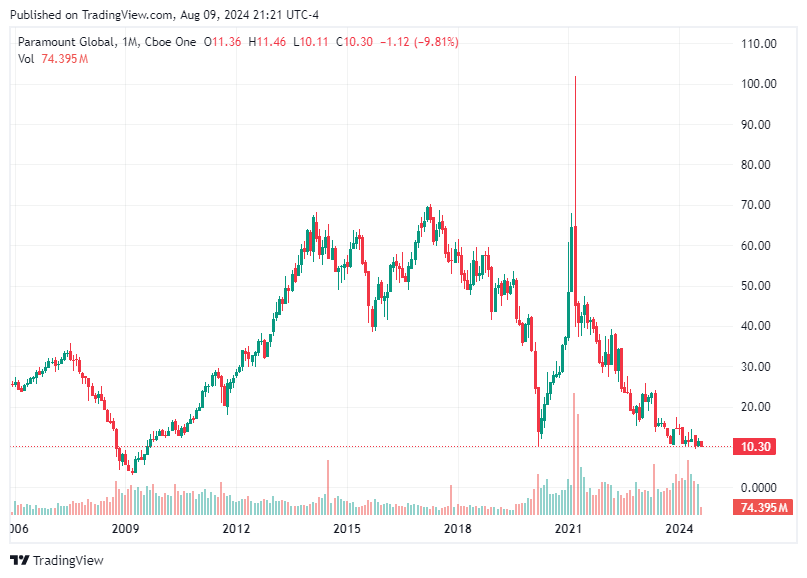Paramount Global Cuts Up To 2,000 Jobs
Paramount Global's Financial Decisions: A Comprehensive Analysis

Disclaimer: This article is for informational purposes only and does not constitute financial advice. Readers are encouraged to conduct their own research and consult with a qualified financial advisor before making any investment decisions.
Real-time information is available daily at https://stockregion.net
Paramount Global, the parent company of renowned channels such as Comedy Central, MTV, and Nickelodeon, recently took significant financial steps aimed at navigating the evolving landscape of the media industry. With a substantial write-down of nearly $6 billion and a workforce reduction of approximately 2,000 jobs, Paramount’s actions mirror the broader challenges faced by traditional media conglomerates in an era increasingly dominated by streaming services.
The $6 Billion Write-Down: A Strategic Necessity
The announcement of a $6 billion write-down by Paramount Global came just a day after Warner Bros. Discovery announced a similar financial charge. This substantial write-down reflects the declining value of cable-TV networks, an asset class that has been disrupted by the rise of streaming platforms like Netflix and Disney+. Traditional television networks, once the cornerstone of media companies, are seeing their valuations plummet as audiences migrate to online streaming services that offer convenience, a vast array of content, and often, lower costs.
In tandem with the write-down, Paramount Global revealed plans to cut about 2,000 jobs, representing 15% of its U.S. workforce. This move is part of a broader strategy to save at least $500 million in annualized costs. While layoffs are always challenging, especially for the affected employees and their families, they are sometimes necessary for companies to streamline operations and remain competitive in an industry undergoing rapid transformation.
Despite these cuts, investors responded positively to the news. Paramount shares surged in premarket trading, reflecting a market perception that the company’s cost-cutting measures may position it better for future growth. This reaction presents the importance investors place on a company’s ability to adapt and restructure in response to market conditions.
Decline in Q2 Sales
Paramount Global’s financial report for the second quarter revealed an 11% year-over-year decline in sales, dropping to $6.81 billion. This decline was notably pronounced in its TV Media unit, which saw a 17% decrease in revenue. The company attributed this drop primarily to fluctuations in licensing revenues. Licensing, a once-stable revenue stream, has become increasingly volatile as content consumption patterns shift and as the competition for content intensifies among streaming platforms.
One of the most significant challenges facing traditional media companies like Paramount is the transition to a streaming-centric model. With the introduction of Paramount+, the company entered a crowded market dominated by established players like Netflix, Amazon Prime Video, and Disney+. Despite initial successes, Paramount+ saw a decline in subscribers, falling by 2.8 million to 68 million in the second quarter. This decline was largely due to the planned exit from a hard bundle agreement in South Korea, highlighting the complexities and regional challenges inherent in the global streaming market.
Despite the current challenges, Paramount Global remains optimistic about the future profitability of its streaming service. The company has set a target for Paramount+ to reach domestic profitability by 2025. Achieving this goal will require not only managing costs effectively but also ensuring a steady stream of high-quality, compelling content that can attract and retain subscribers. Paramount's recent merger with Skydance Media is another strategic move aimed at bolstering its content pipeline. Skydance Media, known for its production of blockbuster films and popular television series, brings valuable assets and creative capabilities to Paramount. This merger could enhance Paramount’s competitive edge in both traditional and streaming media markets.
Financial Health and Market Strategies
The actions taken by Paramount are indicative of broader trends and challenges in the media industry. The shift from traditional cable-TV to streaming has forced many media companies to reevaluate their business models and asset valuations. Companies that were once heavily reliant on advertising and licensing revenues from cable-TV are now investing heavily in streaming technology and content creation. Warner Bros. Discovery’s recent financial charge and Disney’s ongoing investment in Disney+ are examples of how other major players in the industry are also navigating this transition. The media landscape is becoming increasingly fragmented, with consumers having a plethora of choices for content consumption. This fragmentation poses both opportunities and challenges for media companies as they strive to capture and maintain audience attention.
For investors and stakeholders, understanding the financial health and strategic direction of media companies like Paramount is crucial. The $6 billion write-down, while substantial, can be seen as a necessary step to align the company’s balance sheet with the current market realities. By acknowledging the reduced value of its cable-TV assets, Paramount is positioning itself to better focus on the future growth potential of its streaming services. The reduction in workforce, though difficult, is part of a broader trend of cost-cutting measures across the industry. Media companies are increasingly looking to streamline operations, reduce overhead costs, and invest more strategically in content and technology that can drive future growth.
Paramount Global’s recent financial decisions showcases the challenges and opportunities faced by traditional media companies in the digital age. The $6 billion write-down and the reduction of 2,000 jobs are decisions aimed at repositioning the company for long-term success in an increasingly competitive and fragmented media landscape. As Paramount continues to invest in its streaming services and strategic partnerships, its ability to adapt and innovate will be critical to its future success.
Disclaimer: This article is for informational purposes only and does not constitute financial advice. Readers are encouraged to conduct their own research and consult with a qualified financial advisor before making any investment decisions.
Real-time information is available daily at https://stockregion.net


